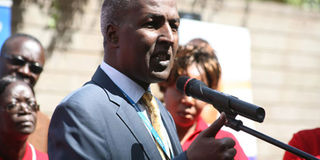A first as army man named police boss

Postmaster-General Hussein Ali in his first public appearance at the Teleposta towers January 18,2011 since being indicted as a post-election violence suspect by the ICC. Photo/HEZRON NJOROGE
What you need to know:
- The paratrooper had express instructions to fight escalating crime perpetrated by militia groups and initiate reforms in the force that had lost much credibility in the eyes of the public.
- He served for six years under one of the most tumultuous periods in the history of Kenya.
Mohamed Hussein Ali became the first outsider ever to be appointed police commissioner.
Ali was a brigadier in the army and his appointment raised questions as to whether President Mwai Kibaki was trying to militarise the police force.
The paratrooper had express instructions to fight escalating crime perpetrated by militia groups and initiate reforms in the force that had lost much credibility in the eyes of the public.
Taking over from Edwin Nyaseda, Brig Ali — who was appointed together with Joseph Kamau as director of CID — had his work cut out for him.
He served for six years under one of the most tumultuous periods in the history of Kenya.
A statement from the Presidential Press Service stated that “These changes are aimed at injecting new blood into the leadership of the police, giving a new approach in the management of security in the country. Furthermore, the changes are expected to bring into the police force new energy to carry out reforms.”
It continued, “Besides the above changes, a technical committee to oversee reforms in the police has been set up immediately.”
PROMOTED TO MAJOR GENERAL
Ali was promoted to Major General soon after his secondment to the police force as the government emphasised that it anticipated that the reforms he was to spearhead would bring a lasting solution to the insecurity problem in Kenya.
True to his word, his no-nonsense style greatly reduced the crime rate. He is remembered for setting up special police squads that hunted down and killed members of the Mungiki sect.
Maj-Gen Ali had to fight off numerous local and international human rights reports, including that of the UN Special Rapporteur, Prof Philip Alston, which demanded his resignation over the extra-judicial killings.
Prior to this, Ali had come to the limelight over alleged human rights abuses in Mt Elgon, where the police were fighting an insurgency over land started in 2006 by a militia group known as the Sabaot Land Defence Force (SLDF).
The police were accused of using excessive force and targeting the innocent.
But Ali’s major headache came during the 2007/8 post-election violence in which the police were not only accused of being partisan, but also using excessive force, including live bullets, to quell riots.
The Waki Commission pointed out that half of the 1,133 people reported killed in the violence died from police bullets.
Because of this report, Maj-Gen Ali was included in the list of six Kenyans who were initially considered by the International Criminal Court (ICC) prosecutor, Luis Moreno Ocampo, as bearing the greatest responsibility in the post-election chaos.
CHARGES DROPPED
But charges against him and ODM politician Henry Kosgey were dropped for lack of evidence. President Uhuru Kenyatta, his deputy William Ruto, and radio presenter Joshua Sang were charged with the violence in The Hague court.
Later, a report on police reforms by a team headed by retired judge Philip Ransley blamed the police for inefficiency, rampant corruption, and human rights abuses during Ali’s tenure.
“It was apparent that the normal procedures provided for under the Force Standing Orders have been disregarded in the area of discipline, transfers, and promotions, leaving the provincial commanders in disarray.
Corruption within the police is widespread and endemic.
The tolerance levels for corruption for all ranks are unacceptably high,” said the report. It added that the investigative function of the police had weakened and attributed this to “reduced operational autonomy of the CID, transfer practices, and reactive fire-fighting approach to policing”.
In September 2009, President Kibaki named Mr Mathew Iteere the new police commissioner, while Ali moved to the Postal Corporation of Kenya as chief executive.
Born in 1956 in Eldoret, Ali attended primary school in the North Rift town before proceeding to Kolanya Secondary School in Busia in 1974. He attained Division 1 and joined the Kenya Army in 1977.
He rose through the ranks to the position of brigadier in 2003.
He has previously served as a military attaché in Zimbabwe and Uganda, commanding officer, Kenya Army Paratroop Battalion 1983, and commanding officer, Kenya Army 50 Air Cavalry Battalion 1994.





